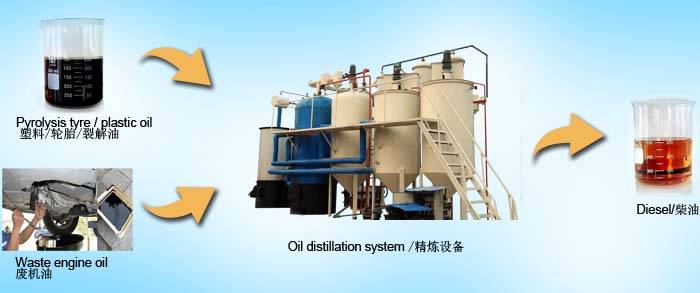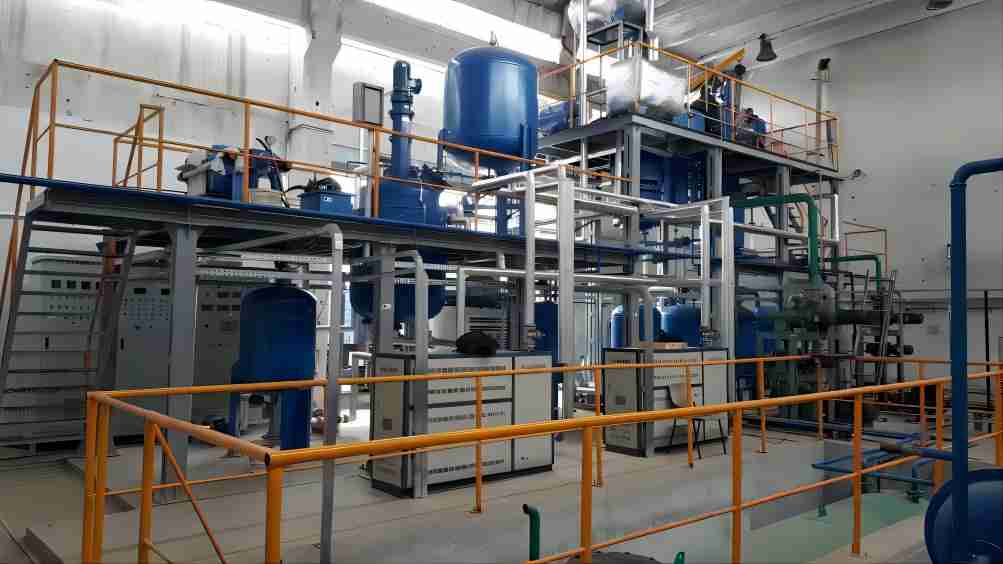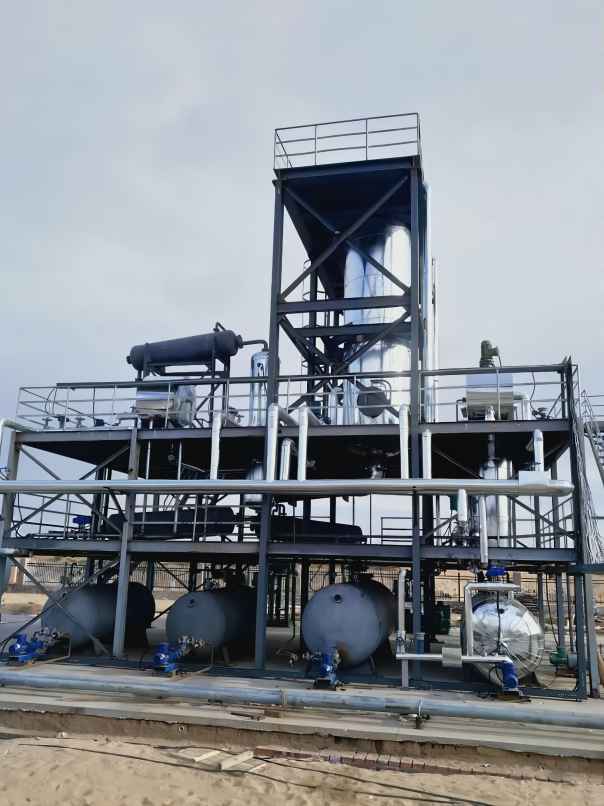The Essential Guide to Waste Oil Recycling: From Collection to Recovery
Used oil, a byproduct of countless industrial and household activities, poses a significant environmental threat if not handled responsibly. Fortunately, waste oil recycling offers a sustainable solution, transforming this potential pollutant into valuable resources. This article delves into the world of waste oil recycling, exploring its key aspects, challenges, and future potential.

The Importance of Waste Oil Recycling
Across the globe, millions of gallons of used oil are generated each year. This substantial volume originates from diverse sources, ranging from car engines and machinery lubrication to cooking in restaurants and industrial processes. When improperly disposed of, this seemingly mundane waste product can have disastrous consequences.
Dumping used oil into landfills or waterways leads to severe environmental damage. It contaminates the soil and water, seeping into aquifers and poisoning vital habitats. This not only harms delicate ecosystems but also threatens human health directly. Ingesting or coming into contact with contaminated water can lead to serious health problems.
Beyond the immediate environmental impact, relying solely on virgin oil for new products carries significant burdens. Extracting crude oil requires intensive energy consumption, generating greenhouse gas emissions and contributing to climate change. Additionally, it depletes a finite resource, raising concerns about long-term availability and economic stability.
Waste oil recycling emerges as a crucial solution to these environmental and economic challenges. By transforming used oil into valuable resources, it offers a multitude of benefits:
- Resource Conservation: Recycling conserves natural resources by giving used oil a second life. Instead of extracting and refining virgin oil, we can tap into this existing resource, reducing our reliance on non-renewable sources.
- Reduced Greenhouse Gas Emissions: Compared to extracting and refining virgin oil, recycling used oil requires significantly less energy. This translates to fewer greenhouse gas emissions, mitigating climate change and protecting the environment.
- Improved Water Quality: Responsible oil recycling prevents contamination of our precious water resources. By keeping used oil out of landfills and waterways, we safeguard the health of aquatic ecosystems and ensure clean drinking water for communities.
- Economic Benefits: The recycling industry creates jobs, drives innovation, and contributes to a more sustainable economy. By developing and utilizing recycling technologies, we can create new opportunities while reducing dependence on harmful extraction practices.
Waste Engine Oil Collection: A Multi-Faceted Approach
Collecting used oil effectively is the first step in the recycling process. Various methods cater to different sources and volumes:
1. Household Collection
- Drop-off centers: Local auto parts stores, recycling facilities, and designated collection points offer convenient avenues for individuals to dispose of used oil responsibly.
- Mail-back programs: These programs provide pre-paid containers for easy disposal of smaller oil quantities from home, often through partnerships with car care companies or environmental organizations.
- Community oil change events: Temporary oil collection events organized by municipalities, environmental groups, or automotive businesses offer convenient disposal options during oil change seasons.
2. Commercial Collection
- Service providers: Businesses and industries generating large volumes of used oil can contract collection services. These companies regularly collect and transport oil to processing facilities, ensuring safe and efficient handling.
- On-site collection tanks: For facilities producing significant oil volumes, dedicated storage tanks are installed on-site. These tanks provide secure and organized storage until collection occurs.
3. Regulations and Incentives
Government regulations play a crucial role in ensuring proper collection and storage. Many countries have implemented laws:
- Mandatory responsible disposal: Prohibiting the dumping of used oil and mandating its proper collection and recycling.
- Incentives for recycling: Offering financial incentives, such as tax breaks or subsidies, to encourage businesses and individuals to participate in recycling programs.
- Collection facility requirements: Setting standards for the operation and licensing of collection centers and service providers to ensure responsible handling and prevent environmental risks.

Waste Oil Recovery: Transforming Waste into Value
Once collected, used oil embarks on a transformative journey through various recovery processes, unlocking its valuable potential. Here’s a closer look at the most common methods:
Re-refining: This meticulous process meticulously purifies used oil, meticulously removing impurities and contaminants. The result? High-quality lubricant base stock that rivals virgin oil in performance. This reclaimed treasure serves a multitude of purposes, from lubricating automotive engines to industrial machinery, offering a sustainable alternative to virgin oil production.
Fuel Blending: Used oil can be strategically blended with existing fuels like diesel or heating oil, creating a new and usable fuel source. By incorporating recycled oil, this method reduces reliance on fossil fuels and promotes energy efficiency. It’s a win-win, mitigating environmental impact and expanding our energy portfolio.
Beyond Lubricants and Fuels: The versatility of used oil extends far beyond lubricants and fuels. Through specific processing techniques, it can be transformed into asphalt, the essential ingredient for sturdy and resilient roads. Alternatively, it can serve as a feedstock for industrial heating applications, providing a sustainable fuel source for various industrial processes.
Each recovery method shines in its own way:
- Re-refining maximizes the intrinsic value of the oil, offering a near-identical replacement for virgin oil.
- Fuel blending provides a readily usable energy source, directly contributing to reduced reliance on fossil fuels.
- Other methods unlock the latent energy potential of the oil, contributing to sustainable infrastructure and industrial processes.
Waste Oil Recycling Plants: The Engine of Transformation
Dedicated waste oil recycling plants serve as the beating hearts of the transformation process, meticulously converting used oil into valuable resources. Within these facilities, a series of meticulously designed components and carefully executed processes work in concert:
- Collection & Storage: The journey begins with secure storage tanks, designed to prevent leaks and safeguard against contamination. Used oil arrives here, awaiting its turn for transformation.
- Pre-treatment: Before diving deeper, the oil undergoes a purification process. Impurities like water, metals, and sediments are meticulously removed through filtration and other specialized techniques, preparing the oil for the next stage.
- Distillation & Purification: The heart of the operation lies in distillation, a complex chemical process that separates the oil into different fractions. Tailored to the desired end product, this intricate dance removes remaining contaminants, leaving behind a purified base ready for its final transformation.
- Blending & Final Product Storage: Depending on the chosen recovery method, the purified oil takes its final form. In some cases, it may be blended with other ingredients to create specific products like lubricants or fuels. Alternatively, it might be directly stored as the final product, ready for distribution and use in various applications.
- Environmental Responsibility at the Core: Modern recycling plants operate with environmental responsibility at their core. Emission control systems diligently minimize air pollution, ensuring clean air emissions. Additionally, wastewater treatment facilities meticulously process and dispose of wastewater generated during the processes, safeguarding the environment from harmful impacts.
These recycling plants come in various sizes and configurations, each serving a specific purpose. Large-scale facilities, often strategically located near major oil generation points, handle significant volumes, processing vast quantities of used oil. Conversely, mobile units cater to smaller communities or remote locations, offering flexible solutions where large-scale plants might not be feasible.

Challenges and Opportunities: Paving the Way for a Sustainable Future
While waste oil recycling offers significant benefits, several challenges remain:
- Increasing Collection Rates: Firstly, ensuring a high collection rate for used oil remains crucial. Raising public awareness through educational campaigns and accessible resources is vital to inform individuals about proper disposal methods and the importance of recycling. Additionally, expanding the network of convenient collection points, such as drop-off centers at auto parts stores, community events, and mail-back programs, makes responsible disposal easier and more accessible.
- Technological Advancements: Secondly, continuous research and development are essential to improve the efficiency and cost-effectiveness of existing recovery methods. Exploring new technologies like advanced filtration techniques and bioremediation holds promise for more efficient and environmentally friendly oil processing. Additionally, ongoing improvement in existing methods like re-refining and fuel blending can further optimize yield and resource recovery.
- Balancing Economics & Environment: Striking a balance between economically viable recycling processes and environmentally responsible practices is a key challenge. While cost-effectiveness is crucial for wider adoption, it should not come at the expense of responsible waste management and emissions control. Investing in cleaner technologies and exploring innovative solutions that address both economic and environmental concerns are critical for long-term sustainability.
Despite these challenges, the future of waste oil recycling is promising:
- Innovation: The emergence of new technologies like advanced filtration and bioremediation presents exciting possibilities for more efficient and sustainable oil recovery. These advancements not only have the potential to increase resource recovery but also to minimize environmental impact throughout the process.
- Sustainability Focus: Growing global awareness of environmental responsibility is driving increased investment in recycling infrastructure and technology. Governments, businesses, and individuals are increasingly recognizing the importance of sustainable practices, leading to dedicated funding and support for the development and adoption of innovative recycling solutions.
- Collaborative Efforts: Collaboration between diverse stakeholders, including government agencies, industry leaders, and individual citizens, is vital to create a comprehensive and effective waste oil management system. By fostering partnerships and collaborative efforts, we can create a robust ecosystem that promotes effective collection, responsible processing, and widespread adoption of recycled oil products.

In conclusion, waste oil recycling is not just a waste management solution; it’s a cornerstone of a circular economy. By transforming used oil into valuable resources, we conserve natural resources, reduce environmental impact, and create a more sustainable future.







